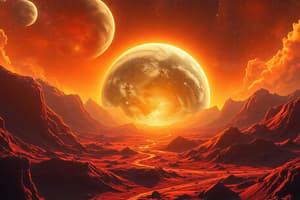Podcast
Questions and Answers
What is the primary characteristic of Earth's atmosphere?
What is the primary characteristic of Earth's atmosphere?
- It consists mainly of helium and hydrogen.
- It has a high concentration of carbon dioxide.
- It is composed primarily of nitrogen and oxygen. (correct)
- It is primarily made up of methane and ammonia.
Which feature of Earth helps shield it from solar and cosmic radiation?
Which feature of Earth helps shield it from solar and cosmic radiation?
- Geological features
- Volcanic activity
- Magnetic field (correct)
- Ozone layer
What unique support for life is provided by Earth's water presence?
What unique support for life is provided by Earth's water presence?
- It allows for the existence of liquid water essential for life. (correct)
- It facilitates the creation of minerals.
- It stabilizes the atmosphere against radiation.
- It prevents volcanic activity.
What role does plate tectonics play in Earth's geology?
What role does plate tectonics play in Earth's geology?
What is a distinguishing feature of Earth compared to other planets in the solar system?
What is a distinguishing feature of Earth compared to other planets in the solar system?
Flashcards are hidden until you start studying
Study Notes
Uniqueness of Earth
-
Habitable Zone:
- Earth is located in the Goldilocks zone of the solar system, allowing for liquid water.
-
Water Presence:
- About 71% of Earth’s surface is covered by water, crucial for life.
- Unique hydrosphere with various water bodies (oceans, rivers, lakes).
-
Atmosphere Composition:
- Earth has a balanced atmosphere composed primarily of nitrogen (78%) and oxygen (21%).
- Presence of ozone layer that protects life from harmful UV radiation.
-
Support for Life:
- Diverse ecosystems support millions of species; Earth shows rich biodiversity.
- Presence of complex food webs and biogeochemical cycles.
-
Geological Activity:
- Active tectonics promotes a dynamic surface, including mountains, earthquakes, and volcanic activity.
- Unique geological features like plate tectonics, which recycle nutrients.
-
Magnetic Field:
- Earth has a strong magnetic field generated by its molten core, shielding it from solar and cosmic radiation.
-
Climate Regulation:
- Earth's climate is regulated by water, vegetation, and atmospheric conditions, allowing for varied weather patterns.
-
Natural Resources:
- Abundant natural resources (minerals, fossil fuels, forests) that support human civilization.
-
Evolution of Life:
- Earth's life evolved over billions of years, showcasing complex biological processes and adaptation.
-
Human Presence:
- Unique in supporting intelligent life capable of altering the environment and technology development.
-
Astronomical Context:
- Unlike other planets in the solar system, Earth has a moon that stabilizes its tilt and climate.
-
Cultural Diversity:
- Home to diverse cultures, languages, and societies with complex histories and knowledge systems.
Uniqueness of Earth
-
Habitable Zone:
- Earth resides in the Goldilocks zone, ideal for maintaining liquid water, essential for life.
-
Water Presence:
- Covers approximately 71% of the planet's surface, supporting various life forms through a unique hydrosphere comprising oceans, rivers, and lakes.
-
Atmosphere Composition:
- Primarily nitrogen (78%) and oxygen (21%), creating a balanced environment conducive to life.
- The ozone layer is crucial for blocking harmful UV radiation.
-
Support for Life:
- Houses diverse ecosystems that sustain millions of species, demonstrating rich biodiversity.
- Features complex food webs and biogeochemical cycles that uphold life processes.
-
Geological Activity:
- Active tectonic processes create a dynamic surface marked by mountains, earthquakes, and volcanic eruptions.
- Plate tectonics play a critical role in nutrient recycling and geological diversity.
-
Magnetic Field:
- A robust magnetic field, formed by the molten core, protects the planet from solar and cosmic radiation, enhancing the stability of its environment.
-
Climate Regulation:
- Regulated by water, vegetation, and atmospheric conditions, leading to diverse weather patterns that support varied habitats.
-
Natural Resources:
- Rich in minerals, fossil fuels, and forests, which are vital for human civilization and economic development.
-
Evolution of Life:
- Life on Earth has evolved over billions of years, showcasing myriad complex biological processes and adaptation mechanisms.
-
Human Presence:
- Unique in fostering intelligent life that can significantly alter the environment and create advanced technologies.
-
Astronomical Context:
- Earth’s moon stabilizes its axial tilt and climate, differing from other solar system planets and contributing to seasonal variations.
-
Cultural Diversity:
- Hosts a plethora of cultures, languages, and societies, each with rich histories and complex knowledge systems.
Studying That Suits You
Use AI to generate personalized quizzes and flashcards to suit your learning preferences.



